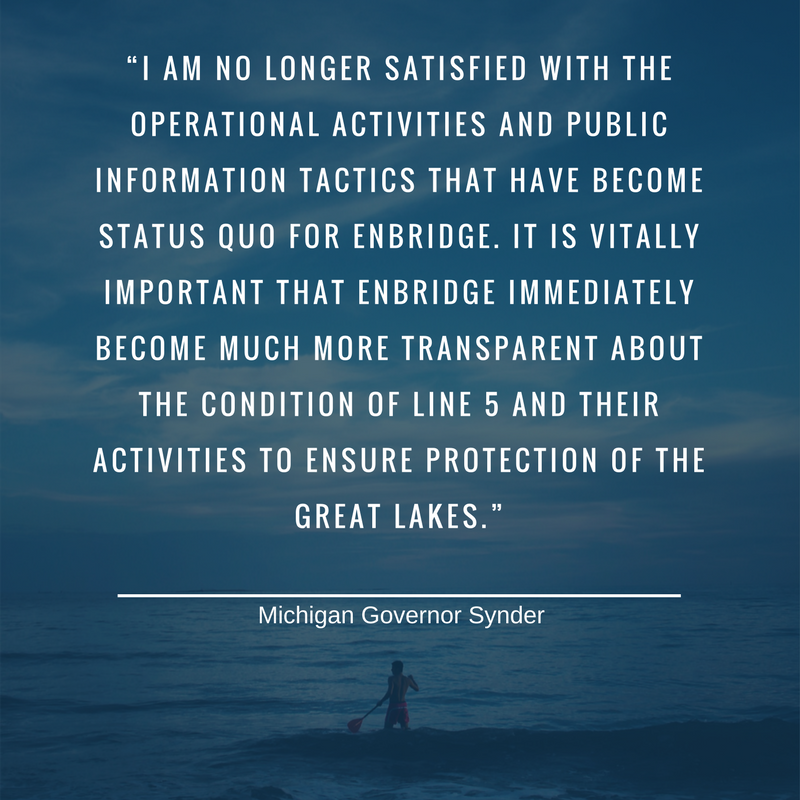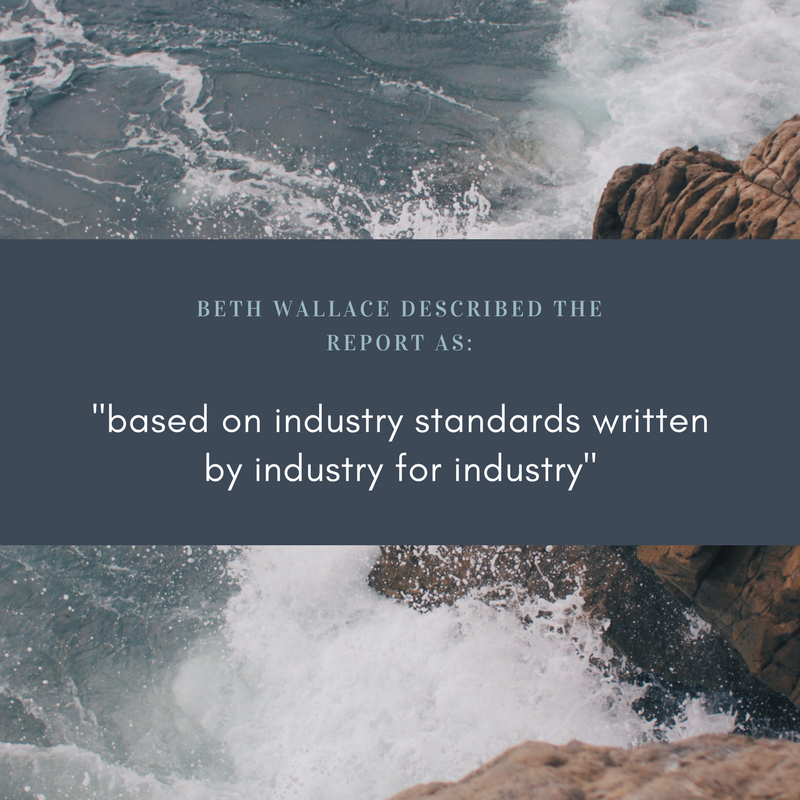This has been quite a month for tar sands and oil pipeline news! If you are having trouble keeping up with it all, read on for a summary, including new reports and concerns about Line 5, the Keystone XL decision, pipeline investment, and more.

New information and new threats of Line 5
Line 5 runs from Superior through Northern Wisconsin and the Upper Peninsula into the Lower Peninsula of Michigan. It travels under the Straits of Mackinaw, where Lake Huron and Lake Michigan meet. This crossing has been referred to as the ‘worst place in all of the Great Lakes for a crude oil spill’ by Dave Schwab, a hydrodynamics expert from the University of Michigan. Concerns around the pipeline include the age (it was commissioned in 1953), the risk of a spill (there have been 29 leaks spilling more than 1 million gallons during its lifetime), and the impacts of a spill (42 million people rely on the Great Lakes for drinking water). Government officials, businesses, tribes (including the Bad River Tribe), environmentalists, and others have called for the concerns to be addressed and pipeline decommissioned immediately.
Earlier this year, it was discovered that the coating on the pipelines under the Straits of Mackinaw was wearing off. This elevated the concerns over the potential for a spill. Now, it is being reported that Enbridge has known about these concerns for years, despite denying them until recently. Governor Snyder responded with the following statement:
“Enbridge’s announcement today about Line 5 is deeply concerning. While it does not indicate any imminent danger for the Great Lakes, this causes significant concern for the long term. I am no longer satisfied with the operational activities and public information tactics that have become status quo for Enbridge. It is vitally important that Enbridge immediately become much more transparent about the condition of Line 5 and their activities to ensure protection of the Great Lakes.”
Line 5 Alternatives Report Released
On Monday, the Michigan Department of Environment released the study that looked at alternatives for the Line 5. The report looks at the feasibility of different alternatives to the pipeline including:
- Decommission Line 5 and construction a new pipeline
- Decommission Line 5 and transport the oil through other pipeline—this portion of the report included looking into whether Wisconsin’s Line 61 Corridor could transport the oil instead
- Decommission Line 5 and use alternative transportation options (like trucks and rail)—this portion includes a look at the rail system in Wisconsin and if this alternative was implemented, the heavy impact on our rail system.
- Replaces Line 5 with a conventional or tunnel installation
- Do nothing—continue operating Line 5 as is
- Decommission Line 5 and do not transport the oil
The report was met with a lot of criticism including:

- The ‘oversimplified risk and impact assessments’, when the report was supposed to consider the ‘worst case spill scenario’ as the basis for all the alternatives
- The overfocus on the impacts on Enbridge and their finances instead of the impacts of a spill on residents- Beth Wallace of the National Wildlife Federation said it appeared to be “based on industry standards written by industry for industry.”
- The implication that a ‘do-nothing’ scenario is a viable alternative
- The failure to take comments from the draft report into account
The report does acknowledge the reports about the coating concerns were not taken into account when analyzing the risk factor.
Public comments are welcome until December 19 and there are three public hearings being held in mid-December.
Anne Woiwode, Conservation Chair, Sierra Club Michigan Chapter concluded:
“We urge the Administration to move swiftly to shut down Line 5 and protect our Great Lakes, coastal economies, and continued way of life in Michigan. It is not Michigan’s job to protect a Canadian oil company’s profits for oil that mostly goes back into Canada - our leaders’ job is to protect the Great Lakes, Michigan citizens, and businesses.”
Journal Sentinel Continues Pipeline Series
The Journal Sentinel has added two excellent articles to its pipeline series that began earlier this year that looks at Enbridge’s pipeline network and the impacts on Wisconsin:
Opening a Wisconsin spigot? looks at the Line 5 alternative report and the likelihood that shutting down Line 5 could mean another pipeline in the Line 61 corridor. The article states:
“The fate of Line 5 is critically important to Wisconsin because if the pipeline is closed, the alternatives analysis hints it would increase pressure to add another Wisconsin pipeline to a system that now carries about 2 million barrels per day through the state to the Illinois border.”
The latest article, Greasing Oil’s Path provides a thorough summary of the property rights concerns with a new pipeline. It includes the compelling stories of the Engelkings in Superior and James Botsford of Wausau, as well as the recent changes to Wisconsin’s eminent domain law.
In 2015, Enbridge persuaded Wisconsin Republicans, who have long expressed vigorous support for private property rights, to change the state’s eminent domain law. The change makes it easier for the company to turn to the government to force property owners to allow construction crews to bury new pipes across their land.
The move stunned many citizens in the path of the potential pipeline, but it came as no surprise to those who have resisted the company’s expansion efforts in recent years.
“Enbridge seems to have this kind of entitlement mentality that we are a big corporation and we have a right to do this, and you can’t stop us,” said the Engelkings’ attorney, Kevin Sandstrom.
Line 3 Evidentiary Hearings Come to an End
The public comment period and evidentiary hearings for the Line 3 Replacement pipeline have ended in Minnesota. The Administrative Law Judge is expected to make her recommendation in the spring. After that, the Public Utilities Commission will issue its decision. The 13 young people, known as the Youth Climate Intervenors, were profiled in The Nation here.
Nebraska Public Utilities Commission Slows Down Keystone XL Pipeline
On Monday, the Nebraska Public Utilities Commission (PUC) made its decision on the Keystone XL Pipeline. If TransCanada had received the full approval they sought, it would have been the final approval TransCanada needed before they could move forward on the construction of the pipeline. President Trump signed off on federal approval for this project earlier this year.
The Keystone XL Pipeline is a horrible proposal. It would: enable barrels of tar sands oil to flow through the United States, likely to be exported; jeopardize the Ponca Trail of Tears; ignore the concerns of Tribal Nations in Nebraska and South Dakota; require the taking of land from farmers and ranchers; jeopardize the Ogallala Aquifer and the millions who depend on it for drinking water; and exacerbate the devastation on our climate. The Intertribal Coalition of Nebraska (made up of the Ponca, Santee, Winnebago, and Omaha tribes), the Ponca Nation of Oklahoma, landowners across Nebraska, and environmentalists and climate activists throughout the world have called for the pipeline to be rejected.
In a 3-2 vote, the PUC voted to approve the Keystone XL Pipeline if built next to the existing pipeline. On the surface, this looks like a win for TransCanada. However, this creates a (possibly insurmountable) barrier for them. They will have to go back to the drawing board and obtain easements from landowners, get local, state, and federal permits, and go through the full Presidential Permit process again. This could take years and its possible TransCanada or its investors will not want to wait for it. Throughout the PUC process, TransCanada said an alternative route was not feasible. On Friday, TransCanada filed for reconsideration.
This is a victory for the Keystone XL fight and everyone who participated in sending public comments, joining a march, sharing information online, or participated in any other way, made it possible. ,” Learn more here.
Pipeline divestment continues
A report released by Greenpeace and Oil Change International, “In the Pipeline: Risks for Funders of Tar Sands Pipelines” examines the financial risks of the Keystone XL Pipeline, Line 3 Replacement Pipeline and Trans Mountain Expansion Pipeline. The report concludes:
These projects carry many of the same potential risks for banks and investors as arose with the Dakota Access Pipeline (DAPL) including a lack of and/or inadequate process around Free, Prior, and Informed Consent (FPIC) from all Indigenous Nations and Tribes along or impacted by the proposed pipeline routes and the risk of contamination of drinking water in the event of a spill. However, the willingness of many banks to arrange or provide financing for tar sands pipelines suggest that they have failed to learn from the media, investor and consumer criticism arising from DAPL and appear to be relying on outdated or inadequate risk assessment and mitigation frameworks.
A report released by the Rainforest Action Network and a number of other groups, “Funding Tar Sands: Private Banks vs. The Paris Climate Agreement,” identifies the banks supporting the pipeline companies TransCanda, Kinder Morgan, Enbridge, and Teck Resources and calls on the banks to align their policies with the Paris Agreement’s target of limiting the impacts of climate change.
“At the COP, while governments prepare to take stock of their progress toward reaching the Paris Agreement goals, banks must do the same,” said Patrick McCully, Rainforest Action Network’s Climate and Energy Program Director. “We call on global banks to establish policies immediately that align their actions with their stated support for averting climate disaster and respecting Indigenous and human rights. This must include exiting the tar sands sector and strengthening policies to ensure that Indigenous rights are respected.”
As Honor the Earth and Minnestoa350 point out, the report shows that US Bank discontinued its financing of Enbridge that was used for the Line 3 Replacement project. The press release concludes:
“It’s become clear that the numbers behind dirty energy don’t add up, and this represents a striking signal to financial institutions everywhere,” says Sarah Harper, one of 13 Youth Climate Intervenors officially participating as stakeholders in the Line 3 legal case. “Financial institutions should stop financing practices that harm the health of our communities and our future by directly contributing to climate chaos.”